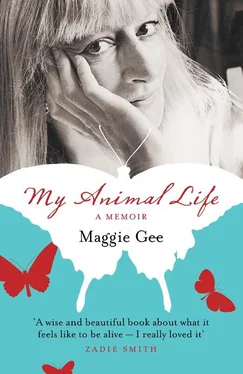From my family of men, of brothers and fathers and uncles and boy cousins, I learned to love men, and to see them as touching, though I also learned they were explosive and needy. I mustn’t give everything. Stand my ground . Yet sexually, I yielded too easily. I wanted to please them, as well as myself. I wanted to please them, or I wanted to placate them?
What do men need from women? The answers I grope for don’t come from having got this right, but from getting it wrong, and seeing others get it wrong.
I think they want appreciation of their male virtues. There are lovable traits which I do see as male, not that they are exclusively so. Being brave or rash or funny, devoting themselves to single tasks or causes. Being physically strong. Having big ideas. Dreaming, carrying, and making. Founding states or cities, being ready to die for them. Forgiveness for their male faults: being one-track minded, forgetting the details, not noticing what’s going on emotionally, disliking being told about it, not wanting to talk (though sometimes that’s a virtue), thinking they are sick when they are not, being too ready to fight and die or send others off to do so for a cause. (Of course many women also do these things.)
But what if men use their strength the wrong way? What if they prevail by violence, or fear? Then they need a woman to stand up to them, or leave them. A sad fact: most of us behave as badly as the people who live with us allow.
I have seen how men like to have motherly care. Acceptance, rather than amused, sneering toleration, of their masculine bodies. Sex as an expression of that absolute acceptance and tenderness, which often means oral sex. Men want to be wanted, just like women. Some have been amazed when I wanted them. Emotional closeness — when they feel like it. Friendship. To be listened to. To be admired for the efforts they make, and respected.
Not to be belittled, in public or private. A home where the father is truly welcome, not excluded, plotted against, marginalised. Children who are encouraged by the mother to love them. It sounds obvious, but it doesn’t always happen. This was the guerrilla war my mother fought, because she didn’t dare do anything braver. So she kept Dad in the dark, and laughed at him. Not always, though: ‘Your dad’s a good provider.’ And ‘Don’t upset Dad.’ But also ‘Don’t tell Dad.’ So the kitchen would fall silent when Dad came in. It wasn’t a good feeling. It didn’t make him happy.
What do women need from men? What do I need to be happy? Many of the same things, of course. Love, tenderness, not to be belittled (though I like to be teased. It’s a conundrum.) A child, friendly companionship, a home.
I know my mother craved recognition for the care she gave to men and to children, to Dad and to Grandpa, after his stroke, to all of us: she cooked every single meal, shopped and planned, paid bills and made appointments, did the washing and ironing. To be fair, my father often said thank you, and so does my husband, which is very important, though he has much less to thank me for, because nobody irons, and there’s a washing machine.
Sometimes women need care from men in return. There my own father did less well. When Mum was ill for a month after giving birth to my younger brother, he cooked soft-boiled eggs at furious speed: shuddering whites, still transparent, with the coiling cord fully visible, and would not learn, though no one could eat them, and the eggs ended up on the side of the plate, small crumbled abortions, viscous and gleaming, stuck over with messy mosaics of shell: alternating this treat with ‘Vermicelli Cheese’, his favourite dish, which he cooked quite well, but its regular wormy gleam made us hate it. Whereas my husband cooks fluently and cheerfully, modern, interesting food with lots of ginger and garlic, chopping vegetables with the radio on, not fussing, asking only to be left alone; and always brings me cups of tea in the morning, when I am obtuse and drugged with sleep, having fizzed and gabbled in the early hours while he is dropping off like a baby.
I like appreciation of my female virtues: making things beautiful, seeing to the details. Mostly it’s women who do the flowers, tracking them down in the winter garden, the last peaky rose, a red geranium leaf, a Japanese lantern minus half its blazing orange but revealing the elaborate lace of its structure; together on the table, they’re a small miracle. Lovely when a man enjoys it. My green-fingered mother expressed herself by growing African violets from seed, and had Africa in bloom in every corner of her bleak ’60s kitchen, white, pink, mauve, lush and plump-leaved, insubordinate, and another year, the toothed hearts of coleus, flame shooting out of the pink Formica.
Is it mostly women who notice when people are unhappy? Maybe. Maybe we’re more porous to other people. That gives us a chance to offer comfort. (But sometimes it’s better to glide over things; if you see what’s going on, it becomes harder for the sufferer to choose to hide it; and men know that instinctively.)
We show realism when dealing with dreams, though this can also be the vice of small-mindedness. And women are funny in a different way; we enjoy telling stories against ourselves. We find ourselves ridiculous.
We endure hardships, and remember dull things — dates, schedules, responsibilities. But no one is ever going to thank us for this, particularly when the tasks are to be done by others. ‘Have you written that thank you letter to your sister? Did you remember your maths homework?’ I am sometimes the Lexicon of Other People’s Duties. Nobody likes a lexicon.
We need forgiveness for our female faults: obsessing about detail, worrying too much, talking about feelings when men don’t want to, criticising, thinking about the past, cleaning up when we could be having fun. Guilty on all counts, your honour. (But of course men do all these things too.)
We need to be seen as individuals, people who exist outside the home. I have always taken this for granted; I shouldn’t. My father didn’t want my mother to work.
Loyalty as we age from a good lover, who goes on wanting and desiring us. To be made to feel beautiful, however old we are.
If many of these primal needs aren’t met, love turns to enmity, tenderness to meanness, the couple shrinks in lemon juice.
Living through time in a couple isn’t easy. Lives have become very long. Deep and friendly love between a man and a woman is not the easiest thing to find. I can think of a bare dozen happy couples among the many I have known.
But then, it’s 2009, as I write. These are still trying, transitional times. Only in 1919 did British women get the vote. Ninety years ago: that means women are alive who remember their own mothers being unable to vote. Is the problem that we still haven’t got over the war? It is very recent, the period when women were not allowed to graduate, nor to have a claim on their children when marriages broke down. It amazes today’s confident young women to hear that, less than a lifetime ago, women were allowed, as a concession, to go to university, but were not allowed to take degrees. The rage and scorn women show to men — the contempt of female columnists, the boring venting against ‘hopeless Harry’—might just be an unconscious mirror image of the scorn men formerly showed women, when they forbade them half of life.
All the same, scorn helps no one. If you want to get the best from someone, you have to be ready to see something good in them.
(Easy enough to say, but I wish I was always kind, and loving. I know that I am not. I can be cutting, irascible, unfair. The war is in me, and in all of us. We fight for recognition, for freedom from the boredom of small duties — who does what? — for respect of our needs, for space, for money. We fight to be equal, though we know we’re not the same. There are no servants any more to liberate middle-class women from household drudgery; and in any case, when servants were the rule, my family were the servants, I would have been a servant, as my maternal grandmother was. I am still fighting not to be downtrodden like my mother, though no one has ever trodden me down, in fact. Because of my father, I can’t bear my husband shouting, and yet I sometimes shout at him. He has never hit me. If he did, I would leave him.)
Читать дальше












